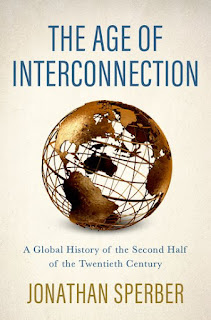 was a New York Times bestseller and a finalist for the 2014 Pulitzer Prize in biography.
was a New York Times bestseller and a finalist for the 2014 Pulitzer Prize in biography.
Sperber applied the "Page 99 Test" to his new book, The Age of Interconnection: A Global History of the Second Half of the Twentieth Century, and reported the following:
Page 99 describes commercial aviation in the 1960s and 1970s. Jet aircraft, invented during the Second World War, reached commercial use slowly, with only 12 commercial jets in the entire world in 1957. By the end of the 1960s, most commercial aircraft were jets; air travel had grown exponentially and was much much faster. There was widespread anticipation things would accelerate still more, with the manufacture of supersonic commerical aircraft. These proved to be a disappointment—giant sonic booms making them unusable over land and enormous fuel usage making them uneconomical even before the oil price shocks of the 1970s. Today, air travel is no faster than fifty years previously and, in view of air traffic congestion and the hub-and-spoke system of flights introduced with deregulation, generally slower.Learn more about The Age of Interconnection at the Oxford University Press website.
This page is a good example of a more general point of my book about technology in the second half of the twentieth century. Crucial technologies were devised during the Age of Total War, 1914 – 45, especially in the Second World War, a hothouse of technological progress. Their initial use in the 1950s and 1960s brought with them great expectations—atomic power too cheap to meter, space flight leading to the colonization of the solar system, computers giant electronic brains thinking deep thoughts. Widespread deployment of these technologies in the 1970s proved disappointing: not working out as planned, too expensive, or prosaic, rather than utopian. The final two decades of the old millennium saw both the introduction of new technologies (think genetically modified organisms) or new uses for old technologies—GPS satellites, for instance—which characterize our contemporary condition.
The Page 99 Test: Karl Marx: A Nineteenth-Century Life.
My Book, The Movie: Karl Marx: A Nineteenth-Century Life.
--Marshal Zeringue



